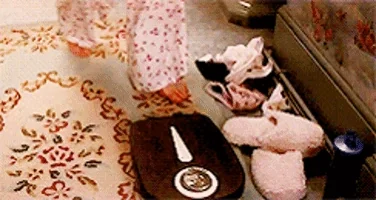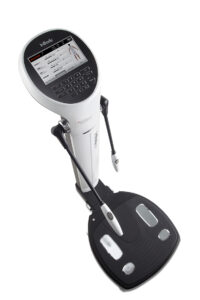December 30, 2024
Dieting but can’t lose weight?
I get it. It’s so frustrating to feel like your body is broken because you’re working so hard at dieting and the weight just won’t come off.

The GOOD news is that it’s almost always a pretty simple fix.
(but that doesn’t mean it’ll be easy!)
Let me tell you about Jamie. She works out faithfully. Her fitness and health have always been a top priority. But despite her dieting efforts, she kept gaining the lbs and they just wouldn’t come off. When she first reached out to me, she felt like her body was broken because it just wasn’t responding to her workouts like she wanted it to.
When we first started working together and I reviewed her food log, I saw that she was making the same mistakes that I see so many of my clients make (I did the same thing once upon a time too).
In her efforts to lose weight she kept reducing more and more. Less calories and less carbs in particular, for much of the day. All week. But many days, by evening she’d be so hungry that she’d snack almost nonstop after dinner. By the weekend, she was so mentally and physically depleted (quite literally) that she’d overeat pretty much non-stop!
When we calculated the numbers, her average daily caloric intake was way above what it should’ve been to support healthy weight loss. This was pretty shocking to her, especially considering how painfully restrictive she was being with herself all week (at least during the days). She thought for sure those numbers would be lower.
Fast forward two months and after regulating hunger hormones by eating more food more often during the day,
Jamie had lost 6 lbs of body fat and gained 2 lbs of lean muscle on her body comp scan!
If you’re willing to dig in and trust the process, I assure you these two simple things WILL make all the difference – just like they did for Jamie.
1. Measure & track with 100% accuracy, and be honest!
This is probably not what you want to hear. I get it, it’s easy to take offence to feeling accused of not being 100% honest with yourself with what you’re eating and drinking. But this IS the most common culprit behind the weight not coming off.
A little bite of this or that, underestimating your rice serving, finishing off your kid’s lunch, drizzling just a tad of your favorite sauce on your chicken… the ways that unaccounted calories can add up are endless. Or here’s another common pitfall – tracking accurately during the week, but ‘relaxing’ (aka eating a kazillion untracked calories) on the weekend.
The good news is that dialling in your accuracy with tracking is the quickest and most effective path to your goals.
Studies show that people who accurately track their food intake for just 7 days lose weight. It may be tedious to measure and track everything, but trust me, it’s a lot easier (and the results will come quicker) than if you’re truly dealing with a slow metabolism or hormone imbalances.
2. Eat more & eat earlier.
If a messed up metabolism or something in your physiology is, in fact, the culprit behind your inability to shed weight – you need to fuel your body optimally to rebuild it and get these things working properly again.
In your struggles to get the weight off, maybe you’ve been restricting more and more. Intermittent fasting, reduced carbs, restricting calories. It’s what the diet culture shoves down our throats every day – reduce and restrict. If there’s one thing you need to hear today, it’s this:
To get your body working for you instead of against you – you must feed it, not starve it.
Eat good quality food, eat regularly (feed your body energy as it is burning energy throughout the day) and eat enough of it. When you impose too large of a restriction in energy (calories, carbs or any other macros that your body depends on), alarm bells are triggered throughout your body.
Low blood sugars, increased cortisol, deregulated hunger hormones… all of which will put your body into fat-storage mode. Worse yet, because you’ve starved all day or all week (raise your hand if you’re ‘good’ all week, then lose it on the weekend’, or you practice IF only to snack non-stop all evening)… only to now be physiologically and psychologically out of control. Hello cravings and ravenous hunger hormones! This usually results in a total diet blow-out, and it’s all happening while your body is already in fat-storage mode from your earlier restriction. Double whammy.
When you consistently meet your energy needs with good quality fuel, the way your body and metabolism works will improve. And that’s when the magic happens. That’s when you have great energy, normal hunger cues, get to enjoy eating lots of food… all while most likely leaning out because your body is taking that food and doing exactly what it’s supposed to do with it – converting it to usable energy and not storing it as fat.
Then, and only then – if you have more body fat to lose, you can implement a small to moderate caloric reduction and your body will respond in the right way to it. That is, it will shed the fat. But the key is to get your body working well first – and that comes from fuelling optimally, not restricting.
BONUS: Eating enough and eating optimally is a whole lot more fun than starving yourself – which means you’re likely to keep it up and actually reach your weight loss goals! This is our jam at Build Nutrition and if you’d like some guidance in figuring out how much and how often to fuel your body optimally, get in touch anytime.
Dieting But Can’t Lose Weight? You Might Be Missing These *2* Things
The entire contents of this website are based upon the opinions of Build Holistic Nutrition. Please note that Build Nutrition is not a dietitian, physician, pharmacist or other licensed healthcare professional. The information on this website is NOT intended as medical advice, nor is it intended to replace the care of a qualified health care professional. This content is not intended to diagnose or treat any diseases. Always consult with your primary care physician or licensed healthcare provider for all diagnosis and treatment of any diseases or conditions, for medications or medical advice, as well as before changing your health care regimen.
© BUILD NUTRITION 2026. ALL RIGHTS RESERVED. PRIVACY POLICY
Go ahead, creep us on social. You know you want to!

